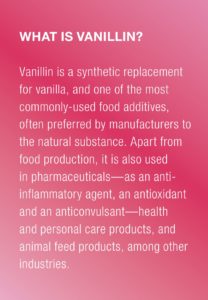
Illustrated by a recent trade secret infringement court case
On 26th February 2021, the Supreme People’s Court of China (SPC) handed down the second-instance judgment in the dispute between Jiaxing Zhonghua Chemical Company and defendants Wanglong Group over the infringement of technical secrets involving the chemical vanillin. The SPC ordered the defendants to cease the infringement and pay damages of Chinese yuan (CNY) 159 million, which is the largest compensation granted by the SPC in a trade secret infringement case to date. By providing an overview of this case, Ivy Liang of Gowling WLG examines how China’s Civil Code will affect the protection of trade secrets in the country.
Case briefing
Jiaxing Zhonghua Chemical Company and its associated companies developed a new production process for vanillin and thereafter protected it as a trade secret. Prior to the infringement in this case, Jiaxing Zhonghua Chemical Company was the largest manufacturer of vanillin in the world, accounting for approximately 60 per cent of the global vanillin market. Following the infringement by Wanglong Group, this share fell to 50 per cent.

In 2010, a former employee of Jiaxing Zhonghua Chemical Company disclosed the trade secrets for the vanillin production process to the chair of Wanglong Group. This former employee subsequently worked at the Wanglong Group vanillin workshop. The Wanglong Group thereafter quickly became the third-largest producer of vanillin globally.
In 2018, Jiaxing Zhonghua Chemical Company initiated civil proceedings against Wanglong Group and its chair as well as the former employee, for the infringement of the technical secrets of vanillin. The plaintiffs sought a cease of infringement order and compensation of CNY 502 million.
Key takeaways
1. Natural persons associated with the infringing company can be held jointly liable
Natural persons—such as legal representatives, beneficial owners of the company, and key management staff—may be held jointly liable with legal persons and/or the company under certain conditions. For example, those who exercised their will by substantially ‘controlling’ the company, and have a common intention to carry out the acts of infringement with the company, might be held jointly liable. In this regard, the court will generally consider certain factors in determining joint liability, including the following:
- The legal representatives, beneficial owners and key management staff of the infringing company that have a history of infringement or other intellectual property (IP) disputes with the right holder;
- The persons who have established one or several companies mainly profiting from the infringement;
- The persons whose personal contact information is regularly used as the prime contact information in the advertisement, official website, microblog or WeChat public account of the infringing company; and
- The persons whose personal bank accounts are used for receiving payment on behalf of the company.
2. The alleged infringer shall bear the burden of proof of the trade secrets’ non-existence
Initially, the preliminary burden of proof falls on the right holder until they provide a reasonable explanation of the distinctiveness of the secrets. At this point, the alleged infringer needs to prove that the information has entered the public domain and is therefore not a protectable trade secret.
In other words, the burden of proof will shift to the alleged infringer after the right holder proves the establishment of trade secrets with prima facie evidence.
3. Conduct not directly related to the infringement can affect the amount of compensation
When determining the amount of compensation, the court might take into consideration the defendants’ conduct or acts during the proceedings. For example, this could include defendants refusing to provide relevant evidence, hindering the investigation, failing to comply with the ruling of the act or asset preservation order, delaying the procedure unreasonably, and so on.
Although the conducts mentioned above are not directly related to the infringement per se, they might be nonetheless considered as decisive elements in determining the amount of compensation by the court.
4. The breakthrough of ‘civil prior to criminal’ procedure
In judicial practice, the courts tend to handle criminal cases prior to civil ones in terms of infringement of trade secrets.
In the vanillin case, the Jiaxing Zhonghua Chemical Company initially reported the infringement to the Public Security Bureau (PSB) and attempted criminal proceeding, to no avail. Once the SPC had handed down its decision in this case that an infringement had occurred, it proactively transferred the case materials to the PSB. The PSB and the procuratorate are expected to start criminal prosecution procedures in the near future.
It can therefore be naturally inferred from this case that the ‘civil prior to criminal’ procedure, meaning starting civil proceedings before resorting to the criminal procedure, should also be considered as a workable choice for the trade secrets right holder.
5. Punitive damages must be claimed in the first-instance proceeding
The Civil Code of the People’s Republic of China, effective from 1st January 2021, extended the system of punitive damages for all types of infringements of IP rights. Punitive damages can be awarded in civil cases to plaintiffs on top of compensation damages if a defendant is found to have committed an offense. However, according to a judicial interpretation issued by the SPC, the plaintiff must actively claim punitive damages, and a court shall not impose punitive damages on a plaintiff ex officio. In addition, punitive damages should be claimed during the first-instance court proceedings.
In this case, as Jiaxing Zhonghua Chemical Company did not claim for punitive damages in the first instance proceeding (as the case was initiated in 2018), the court did not impose punitive damages on the Wanglong Group, despite the case being adjudicated after the Civil Code came into effect.
In trade secret civil cases, the court normally examines the following information below to determine whether an infringement has taken place:
- First, whether the plaintiff is entitled to claim the right to the information involved in the case;
- Second, whether the defendant carried out acts that may infringe the right holder’s trade secrets; and
- Finally, deciding on the specific civil liability to be borne by the defendant.
As the plaintiff bears the primary burden of proof for the existence of the trade secrets, right holders should take the following measures to protect their valuable business and technical information:
- Establish a robust trade secrets protection system;
- Use a valid non-disclosure agreement when dealing with confidential matters or transactions with affiliated companies, employees, or business partners; and
- In the event of possible leakage of trade secrets, promptly approach the relevant professionals first for their assistance in handling the crisis and collecting evidence.
Ivy Liang is a former IP judge in China, with 16 years of experience in the judiciary before joining Gowling WLG. Ms Liang is qualified as a Chinese lawyer, and has extensive and practical experience of all aspects of the judicial system in Mainland China. She gained her LLM degree from the City University of Hong Kong, which equipped her with the horizon of both civil law and common law. Ms Liang excels in developing and enforcing comprehensive online and offline IP strategies in the clients’ best interests.


Recent Comments